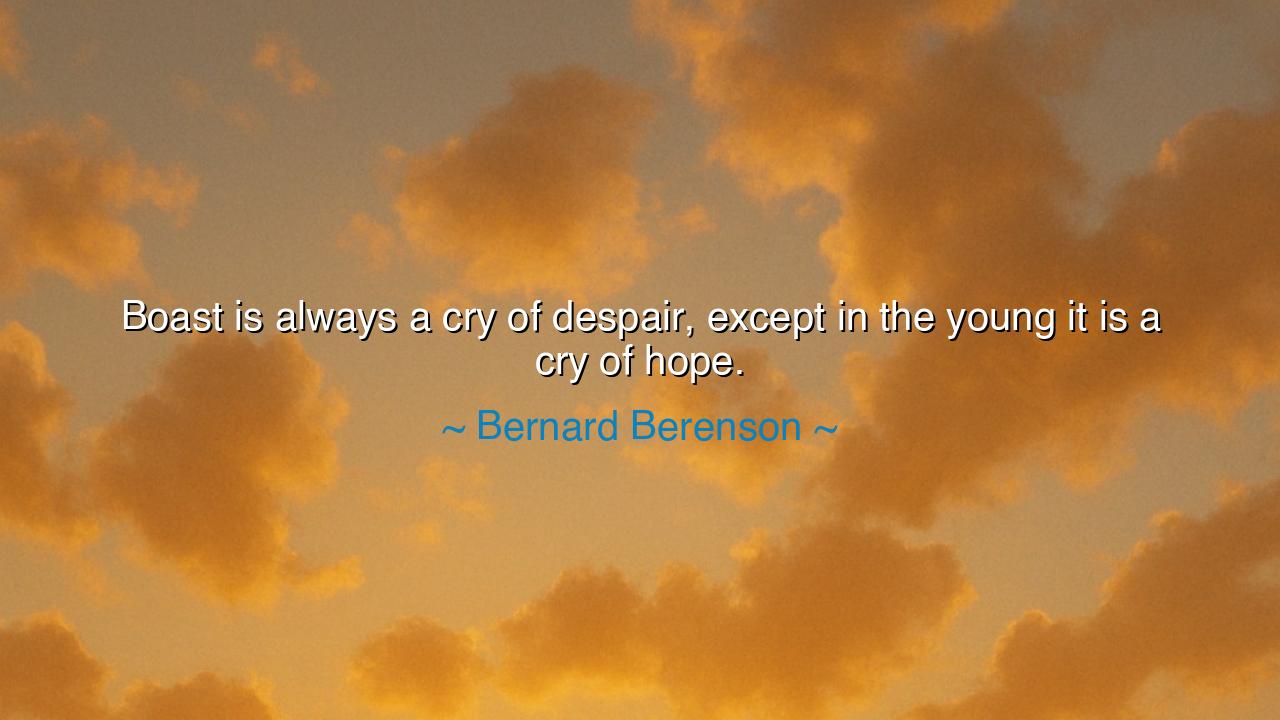
Boast is always a cry of despair, except in the young it is a cry






“Boast is always a cry of despair, except in the young it is a cry of hope.” — Bernard Berenson
In these measured and luminous words, Bernard Berenson, the great art historian and philosopher of aesthetics, uncovers the hidden spirit behind boasting — that peculiar human need to declare greatness before it is proven. His insight pierces through vanity and reveals the trembling soul beneath it. When he says that “boast is always a cry of despair,” he tells us that arrogance often masks insecurity, that the loudest voices are often the most uncertain, and that pride, in its mature form, is not a sign of strength, but of emptiness seeking reassurance. Yet in his mercy, Berenson makes one noble exception: in the young, boast is not despair but hope — the declaration of what they wish to become, not what they falsely believe they are.
Berenson himself was a man of deep reflection, born into hardship and rising to become one of the most respected scholars of the Renaissance. He spent his life studying the art of masters like Leonardo and Botticelli — artists whose work revealed the soul of human striving. From their brilliance and from the struggles of his own life, he came to understand that pride can take two forms: the hollow pride of the fearful and the aspirational pride of the dreamer. The first seeks to hide weakness, the second to overcome it. Thus, his words carry both judgment and compassion — for he saw in boasting not merely vanity, but a clue to the heart’s condition.
In the ancient world, the philosophers and poets spoke much of this truth. The Greeks told tales of hubris, the arrogance that invites the wrath of the gods. When King Xerxes lashed the sea for defying him, it was not his power that was revealed, but his impotence. When Oedipus proclaimed his mastery over fate, it was despair that guided his pride, not confidence. Such boasting is born of fear — the fear of being small in a vast and uncontrollable world. It is, as Berenson said, a cry of despair, the voice of the soul trying to drown out its own trembling. For the wise, such cries are not condemned, but pitied — for they come from pain that does not know how to speak softly.
Yet Berenson, in his mercy toward youth, distinguishes between the pride of despair and the boast of becoming. In the young, boasting is not deceit, but desire. The child who says, “I will be a hero,” or “I will change the world,” is not lying — he is proclaiming faith in the possible. His words are seeds cast into the soil of time. He boasts not because he believes he is already great, but because he longs to be. His boast is a cry of hope, a refusal to be limited by the smallness of the present. And from such cries, greatness is sometimes indeed born.
Consider the story of Alexander the Great, who, as a boy, wept because his father had conquered too many lands and left him nothing to achieve. To his elders, his words sounded arrogant; yet in them burned the divine fire of ambition — not despair, but hope. That boast was the seed of his destiny. And though his empire would one day fall, his vision — to unite the known world — outlived him. His youthful boasting was not vanity, but yearning, the echo of the soul reaching toward its highest possibility.
Berenson’s wisdom teaches us to listen, not only to the words of others, but to the tone of the spirit within them. When an old man boasts, it is often to hide his regret. When a young person boasts, it may be to declare that they have not yet surrendered to cynicism. To boast in youth is to dream aloud; to boast in age is to mourn silently. The challenge for us, then, is not to silence the dreamer, but to teach the young to turn boasting into action, to transform hope into creation, and pride into purpose.
Lesson:
From Bernard Berenson’s insight we learn that the truest measure of a person lies not in their words of grandeur, but in the spirit that moves behind them. If you find yourself boasting, pause and ask: Is this my fear speaking, or my faith? Let not your pride be a mask for weakness, but a mirror for vision. And when you see the young boasting of impossible things, do not mock them — for their words may be the first breaths of greatness. Teach them, instead, to build what they proclaim, and to live what they imagine. For in youth, boasting may indeed be a cry of hope, and it is hope — not despair — that gives birth to every bright and noble thing beneath the sun.






AAdministratorAdministrator
Welcome, honored guests. Please leave a comment, we will respond soon